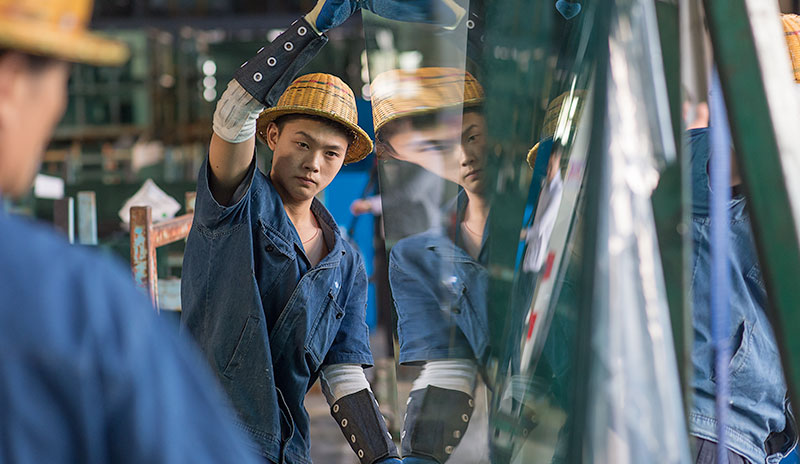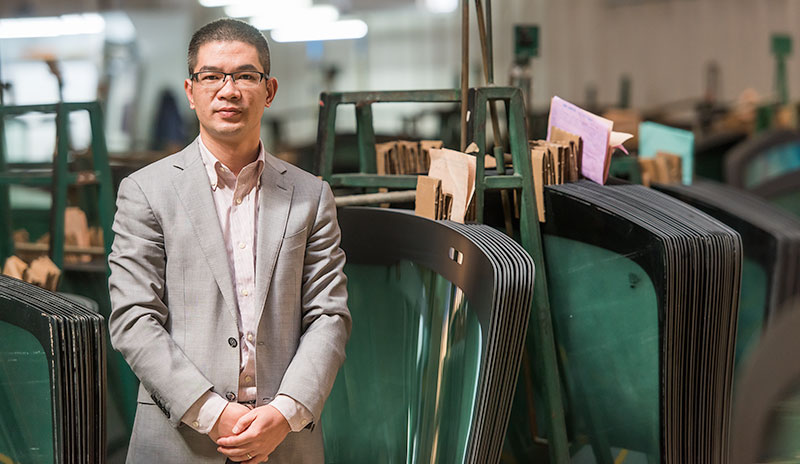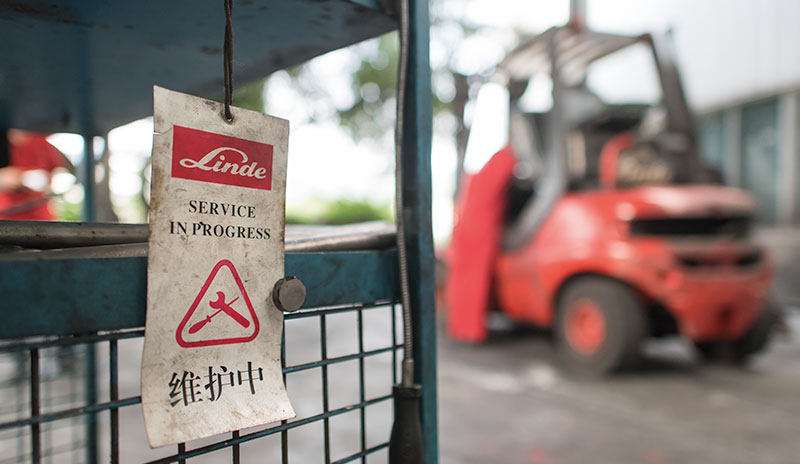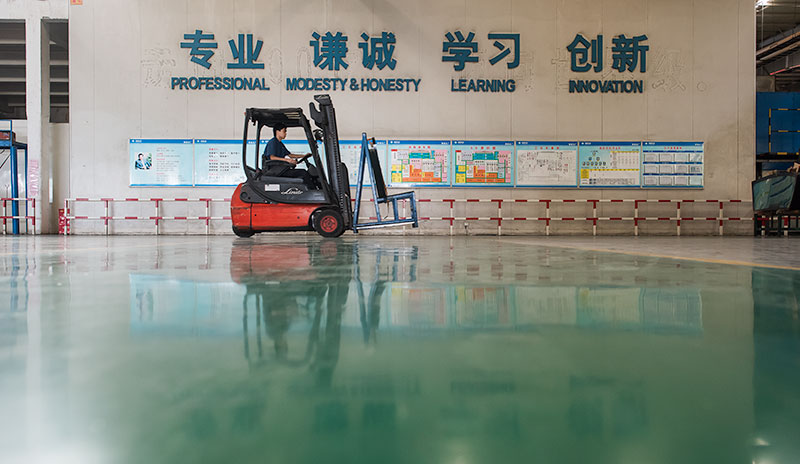Comprehensive.
Trucks and services from a single source – this is the idea at the core of the KION business model. It benefits customers such as Fuyao, a Chinese manufacturer of automotive and safety glass. And is helping it in its quest to become the worldwide number one in the industry.
Trucks and services from a single
source – this is the idea at the core
of the KION business model. It benefits
customers such as Fuyao, a Chinese
manufacturer of automotive and safety glass.
And is helping it in its quest to become the
worldwide number one in the industry.
Two workers carefully lift the huge plate of glass onto the table. One of them shears right across it using a glass-cutter. Each takes one half and places it on a stand. The two men get through around seven plates a minute. They are protected by special gloves and by helmets that look a little like traditional straw hats. Waiting at all times next to the three cutting tables is a Linde forklift truck that carries away the glass-holding stands as soon as they are full – on to the next stage of the process in the hall, where each of the panes is cut to a windscreen shape.
An everyday occurrence at the automotive glass manufacturer Fuyao, in a suburb of the city of Fuzhou on China’s south-eastern coast. But change is afoot. “This work is difficult and dangerous,” says a company spokesman looking at the glass-cutters. “Which is why it will soon be automated.” At the company, robots are gradually taking over work processes such as the cutting and washing of the windscreens. The workers freed up by this are either operating the robots or transferring to new factories. Fuyao is growing quickly, so there’s always demand for labour.
The company, founded in 1987, is one of China’s greatest success stories. It focused on quality at an early stage and reaped the rewards of China’s legendary car boom. Today the country is the biggest automotive market in the world, and Fuyao is the world’s third largest manufacturer of vehicle glass. The company supplies glass to vehicle manufacturers around the globe – including the German powerhouses VW, Audi, BMW and Daimler. Its aim is to be worldwide no. 1 by 2020, says head of purchasing, Teng Yu. “The Chinese market has largely stabilised. We have therefore shifted our focus to overseas markets. They are very important for the next stage in our growth.”
New tasks for the trucks
Although Fuyao has a market share of around 70 per cent in China, its global market share is only around 25 per cent. In the US, the company is building two factories; in Germany it has a branch in Heilbronn. A booming international business, in addition to higher safety requirements and rising labour costs in China, is one of the factors that is causing Fuyao to rapidly automate its manufacturing. Experts believe that the resulting increases in quality, precision and efficiency are critical if Chinese companies are to enjoy sustained global success. China is undergoing a wave of automation, mainly in the wider automotive sector and in high-tech industries. “We are in the process of increasing the level of automation from 50 to 80 per cent,” says Teng Yu. “That’s the same level as in industrialised countries.”
Liu Xueshu is head of the Linde Sales Office in Fuzhou: “Linde is working with Fuyao to develop logistics concepts to adapt the company’s factories to this new, automated style of production.” Teng Yu adds: “As automation increases, we need other types of truck – less of the small ones but more of the heavy-duty trucks in excess of three tonnes. This is because when the glass is packed manually, the package sizes are smaller than when robots do this work.” Fuyao manufactures the raw glass it needs for its products at a site near its automotive glass factory – and that too is already a largely automated process.
At this site, the large forklift trucks bring heavy packages to the loading bay. Inside are panes of glass that measure several square metres. Before this stage, robots cut the ribbon of glass that is extruded from the furnace, and stack up the panes of glass into packs. The only work that is done manually is the securing of the panes with cardboard and foam. Trucks glide across the spacious hall, forwards, backwards. To interact with the fast, agile robots, they have to be highly manoeuvrable, says Teng Yu.
Fuyao needs a whole range of different trucks. The spectrum is so broad that the glass manufacturer is known jokingly at both companies as a ‘display cabinet for Linde products’. Fuyao is one of Linde’s ten biggest customers in China. The company ordered its first trucks in 1995. “We initially tried out several brands,” says Teng. “It was Linde’s quality and service that convinced the Fuyao buyers.” In 2003 Linde became the company’s exclusive truck supplier, and it carries out servicing as part of the contract. More than 1,000 trucks made by Linde China are in operation across the 15 Fuyao factories in China and at one factory in Russia. If they break down, they are repaired on site by service engineers from KION’s premium brand company.
Two other plants are currently being built – one in Wuhan in central China and the other in Shenyang in the north-east. For Shenyang – which will be 80 per cent automated from the outset – Fuyao has ordered 21 new trucks. “Previously it might have been a couple more,” says Liu Xueshu. “But that’s OK because automation is helping Fuyao to grow quickly, which in turn will be to the benefit of Linde.” Fuyao is currently building either one or two new factories every year. In each of the past three years, the company has ordered at least 100 trucks from the KION brand company, which is based in the port city of Xiamen in southern China. These orders are far bigger than any previous ones made by Fuyao and exemplify how the two companies are set to continue growing together.

